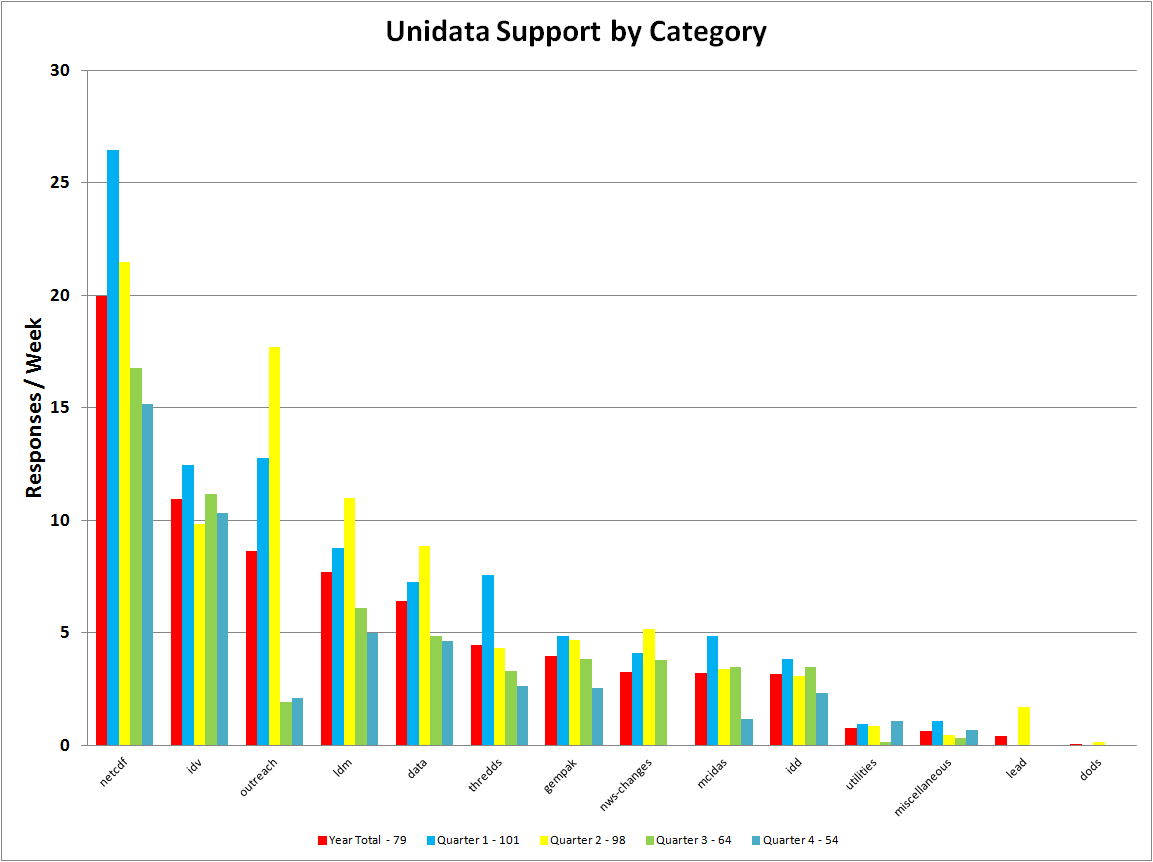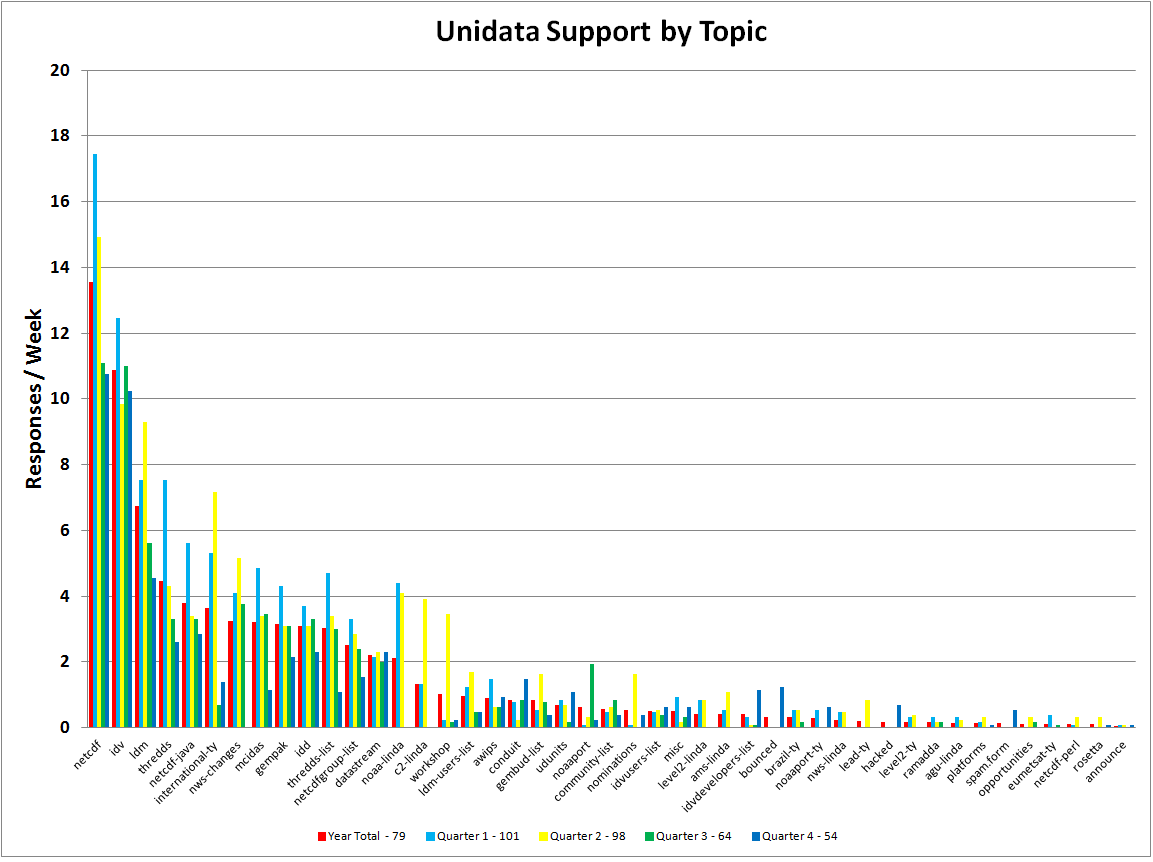User Support
Status Report: October 2013 - March 2014
Tom Yoksas, Jen Oxelson, UPC Staff
Strategic Focus Areas
The Support group's work supports the following Unidata funding proposal focus areas:
- Enable widespread, efficient access to geoscience data
Unidata User Support enables access to geoscience data by supporting the use of tools created and/or supported by the UPC. - Build, support, and advocate for the diverse geoscience
community
The user support provided by the UPC is recognized throughout the atmospheric science community. Unidata's outreach efforts are routinely called out in surveys of the NCAR/UCAR community.
Activities Since the Last Status Report
Training
- The UPC hosted an IDV Short Course at the AMS Annual Meeting in Atlanta, GA in February. The workshop included a presentation and hands-on session showcasing the GEOScience Probe of Discovery (GEOPOD), a National Science Foundation funded project that leverages Unidata's IDV to create an interactive 3-D learning environment where students can navigate a virtual probe through real geophysical data and actuate devices to explore and discover the atmosphere. The course was well atended (22 participants) by university, government, international and commercial users.
- The UPC will participate in a regional workshop hosted by the University of Miami on April 18-19.
Relevant User Support Metrics
Since January 26, 2006 over 40000 user support "transactions" (new inquiries and follow-ups) have been processed through the Unidata inquiry tracking system.
Support by Category

Fig. 1: Above are histograms that portray the number of Unidata email responses for categories of support for a one year period ending March 15, 2014. The histograms are arranged by yearly activity averages with the highest on the left and lowest on the right. Each quarter year within the period is depicted from oldest to newest from left to right. The number of responses has been normalized to weekly averages so that the support load over the various periods can be easily compared.
Individual support activities included in the categories depicted above are listed in the following table.
| Category | Packages, Groups, and Lists |
| data | casestudies, casestudies-list, conduit, c2-linda, craft, craft-nws, craft-ty, datastream, difax, level2, level2-linda, level2-ty, noaaport, noaaport-ty, noaaportldm |
| dods | dods, dods-core, dods-list, dods-tech, dods-team, linda-dods, opendap, opendap-core, opendap-list, opendap-tech, opendap-team |
| gempak | gempak, gembud-list |
| ldm | ldm, ldm-users-list |
| lead | lead, leadusers |
| idd | cluster, idd, idd-antarctic, idd-brasil, idd-caribe, idd-inject, idd-status, scoop, suominet, tigge |
| idv | idv, idvlist, idvsteering, metapps, visad-list, visad-renderer |
| mcidas | mcdevelop, mcidas, mcidas-list |
| miscellaneous | esupport, fxlinux, license, misc, network, notrack, platforms, wxp, wxp-list |
| netcdf | data-models, libcf, ncml, netcdf, netcdf-misc, netcdfgroup-list, netcdf-hdf-list, netcdf-java, netcdf-perl |
| nws-changes | nws-changes |
| outreach | agu-linda, agu-ty, ams-linda, announce, argentina-ty, barbados-ty, brazil-ty, cbmet-ty, chile-ty, egrants, egu-linda, external, iai-ty, meteoforum-ty, mexico-ty, noaa-linda, nws-linda, unidata, workshop |
| thredds | java-dev, java-dev-list, thredds |
| utilities | decoders, ldm-mcidas, udunits |
Support by Topic

Fig. 2: Above are histograms that portray the number of Unidata email responses for individual topics of support for a one year period ending March 15, 2014. The histograms are arranged by yearly activity averages with the highest on the left and lowest on the right. Each quarter year within the period is depicted from oldest to newest from left to right. The number of responses has been normalized to weekly averages so that the support load over the various periods can be easily compared.
Comments
- The marked decrease in the average number of weekly support transactions reflects the decrease in outreach activities formerly performed by Linda Miller who retired in November, 2013, and in international activities that decreased significantly when the UCAR Africa Initiative Google Meningitis project ended.
- The total support provided by the UPC remains high, and yearly totals have been relatively constant for the past two years. Overall support activities vary by somewhat by quarter. Spikes in support for individual packages is largely correlated with the release of new distributions, and, for the IDV in particular, jumps after training workshops.
- Support for netCDF continues to be substantial, and is understandable given the large number of users of the package worldwide.
- The IDV support load is second only to that for netCDF; no large increases have been seen over the past 6 months.
- Support for netcdf-java continues to grow steadily.
- Support for the legacy visualization packages GEMPAK and McIDAS continues to be substantial.
- Support for LDM, IDD, and data continues at a high level and shows some variability throughout the year.
- Taken as a whole, the support required for visualization packages (GEMPAK, IDV, and McIDAS) is comparable to the support related to data reception (LDM, IDD, noaaport).
- The high numbers for outreach reflect the high level of activity in a variety of activities including organizing sessions at various national meetings.
Notes
These numbers and conclusions should not be taken too literally, for several reasons:
- For some packages, multiple responses in the same thread may be bundled into a single archived email. Other packages have each response in a thread counted separately.
- After a new release of software, there may be a flurry of the same or similar questions, which can be answered in separate emails or in a single mailing list posting.
- The graph primarily represents support of end users and site administrators, not developers. Support for non-Unidata developers in projects such as THREDDS, IDV, GEMPAK, and McIDAS requires significant resources, but is difficult to assess.
- Not all support records were indexable for this report. Given this, the above numbers are an underestimate of the actual support being provided by the UPC.
